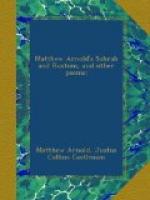=Arnold as a Dramatist=.—The drama is imitated human action, and is intended to exhibit a picture of human life by means of dialogue, acting, and stage accessories. In nature, it partakes of both lyric and epic, thus uniting sentiment and action with narration. Characters live and act before us, and speak in our presence, the interest being kept up by constantly shifting situations tending toward some striking result. As a dramatist, Arnold achieved no great success. Again the fundamental qualities of his mind stood in the way. An author so subjective, so absorbed in self-scrutiny and introspection as he, is seldom able to project himself into the minds of others to any considerable extent. His dramas are brilliant with beautiful phrases, his pictures of landscapes and of nature in her various aspects approach perfection; but in the main, he fails to handle his plots in a dramatic manner and, as a result, does not secure the totality of impression so vital to the drama. Frequently, too, his characters are tedious, and in their dialogue manage to be provokingly unnatural or insipid. They also lack in individuality and independence in speech and action. Many of his situations, likewise, are at fault. For instance, one can scarcely conceive of such characters as Ulysses and Circe playing the subordinate roles assigned to them in The Strayed Reveller. A true dramatist would hardly have committed so flagrant a blunder. Merope is written in imitation of the Greek tragedians. It has dignity of subject, nobility of sentiment, and a classic brevity of style; but it is frigid and artificial, and fails in the most essential function of drama—to stir the reader’s emotions. Empedocles on Etna, a half-autobiographical drama, is in some respects a striking poem. It is replete with brilliant passages, and contains some of Arnold’s best lyric verses and most beautiful nature pictures; but the dialogue is colorless, the rhymes poor, the plot, such as it contains, but indifferently handled, and even Empedocles, the principal character, is frequently tedious and unnatural. Arnold’s dramas show that his forte was not in character-drawing nor in dialogue.




